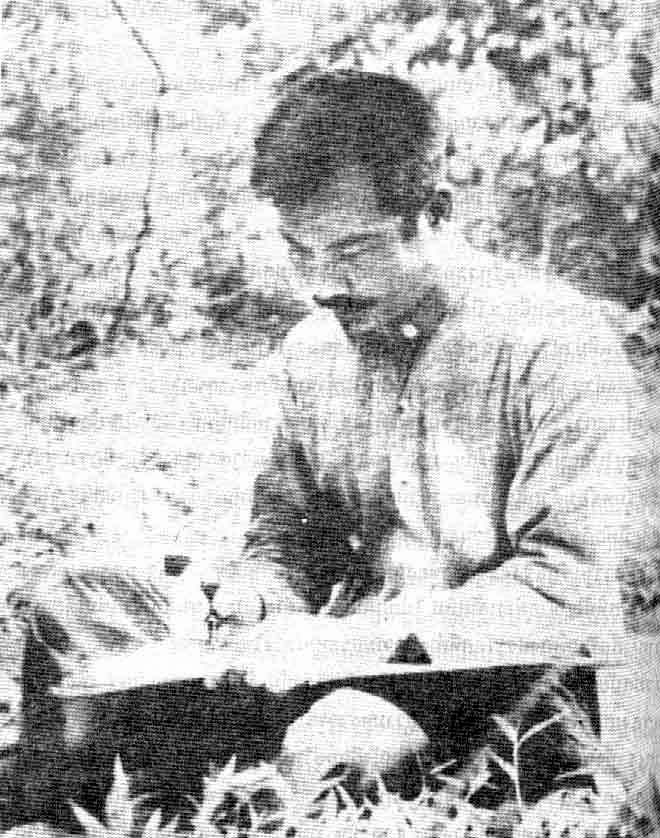I found an article called “American experience towards Lao reading” in Update Magazine (volume 5, issue 7, 2006). It is a monthly magazine published in Vientiane with parallel English and Lao texts. I thank Sasha Alyson for his essay. It contains very interesting observations and fair comment. (The full text of the article is provided below.)
I want to share my experience as a Lao who was born and brought up in Vientiane during the 1970-1980s. I was fortunate to be in a family that had plenty of books to read (in both Lao and Thai) and I remember that reading was part of our everyday life. I always saw my father reading, writing, or telling stories to my mother and brothers and sisters. My mother was illiterate but that did not stop her from being educated. My father would read her his poems and essays (often in draft form) and told her about the history of Laos and our neighbours.
When I was in senior grade in high school, it started to strike me that many of my friends did not have much to read or did not read much (which came first?). I would tell them about the novels I read at home and sometimes I brought the books and read to them. I had to be careful because they were Thai novels and foreign languages were not allowed in school (some languages were foreign but they were allowed). One day I got caught because all my girlfriends were gathered in a circle around me for too long. I did not bring any more Thai books and never told stories again. I was banned from reading at school!
Changing the subject slightly… Recently I was in Pakse for the Vat Phou Champasak February full moon festival. I did not see any bookshops even though Pakse is the second biggest city in Laos (I might be wrong here, perhaps Luangphrabang is the second biggest? Anyway, it is a big city.). There were, however, some books in the market in amongst other goods.
I always want to understand more about why Lao people don’t like to read. Is there anything else to be discussed or learnt about this “culture”? And will having more books available (and hopefully they are good books as well) solve the problem?
American experience towards Lao reading
(This article is taken from The Update (5: 7 2006, Vientiane))
I was very interested to read your article about “The Reasons Lao People Dislike Reading.”
I’m a retired American book publisher. I live in Chiang Mai, but often come to Laos. For the past year I’ve been helping several Lao young people who want to change attitudes about reading. Their goal is to promote literacy by making children’s books that are fun, lively and colourful. Please watch for their books –they all have Big Brother Mouse in the top right corner.
The first five books were just published by Dokked. Everywhere we’ve taken them, children immediately crowd around the book and read together.
Yet it’s true that as a rule, Lao people don’t read. From my experiences in the west, I see several reasons for this.
Firstly and most obvious, of course, there just aren’t enough good books to read. Nobody wants to invest in publishing books until they know people will buy them. But people won’t read until they can buy interesting magazines and books at a price they can afford.
Secondly, I believe many Lao parents don’t understand the connection between reading and education. The United Nations says that having books in the home is the most important things parents can do to improve children’s education. A person reading a book is using their mind much more actively than someone watching television. In the west most parents understand this. But good books have not been widely available in Laos, so Lao parents often see no connection between reading and education.
Finally, reading is a habit. It’s like brushing your teeth: If you learn this habit when you are young, you’ll probably continue it as an adult. Adults in Laos never had a chance to learn the habit of reading. But that can change. Parents who want to help their children’s education can read a story to them each night before bed.
Laos is already making good progress when it can support an interesting and professional magazine like Update magazine. I hope everyone who believes that reading and education are important for Laos will understand how important it is to support Update Magazine, and the Big Brother Mouse books. If we all do what we can, then when Mr. Anoulack goes to the bus station in 10 years, I think he’ll see a new generation of Laotians who are sharpening their minds by reading.
Sasha Alyson
 Facebook
Facebook  Twitter
Twitter  Soundcloud
Soundcloud  Youtube
Youtube  Rss
Rss 
